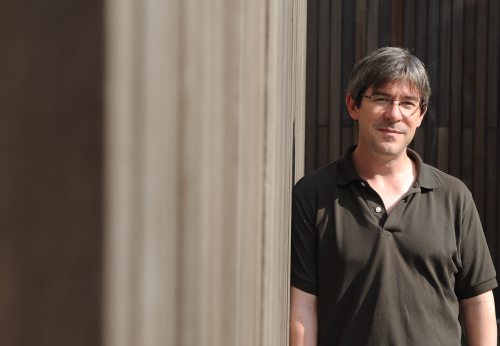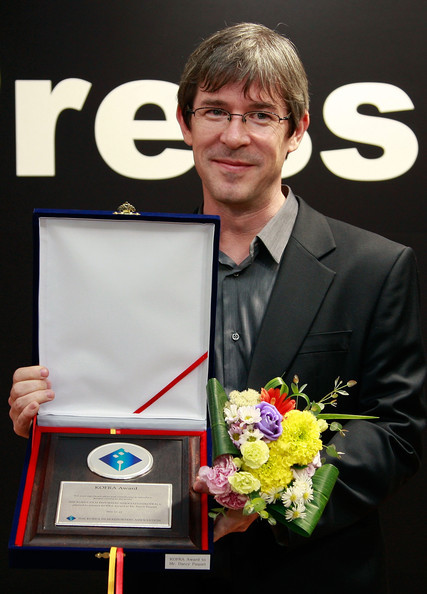Korean films also tend to focus more on character than Hollywood films do, and are more evocative, he said.
“They have a very strong emotional impact often and directors aren’t afraid to push that as far as it will go.”
Although there were a few foreign journalists and film enthusiasts around at the time, Paquet found little information available in English about Korean cinema.
To fill this void, he started Koreanfilm.org to post information and reviews. To Paquet’s surprise, the site rapidly took off and he began receiving emails from Korean film fans from countries as unexpected as Mongolia and Myanmar.
“My timing was really lucky because the site went up not long after the blockbuster ‘Shiri’ (first Hollywood-style film of Korea’s ’90s economic boom) had become a big hit and more and more people were starting to get interested in Korean film,” he reasoned.
But it must have been more than timing. In 2001 the editor of London trade magazine Screen International contacted Paquet, giving him his big break.
“The editor had been reading my website for some time and they were looking for a reporter to cover Korean film news and I didn’t have any experience as a journalist but he said that they were interested in taking me on.”
With no prior experience, but plenty of enthusiasm, Paquet took to his new role with ease, meeting more useful contacts along the way.
“Working as a journalist is a great way to teach yourself, you end up learning a lot about how film making actually works,” said Paquet, 39, who now writes columns and essays for publications around the world.
Of all the films he has seen, he would recommend “The Host” as a good first Korean movie. The 2006 film by director Bong Joon-ho features a monster emerging from the depths of the Han River. Paquet suggested it as an example of a commercial yet well-made film, with a depth built through political subtext.
Alternatively, he said the 2010 film “Poetry” written and directed by Lee Chang-dong is a big hit with enthusiasts of the genre. The story of a woman in her 60s suffering from Alzheimer’s disease, is heavy and slow but “extremely well-made.”
Among Koreans Paquet is most known for his frequent contributions to movie weekly Cine21, but among foreigners, he is most notable for his website. He would like his next project to bring the columns for both audiences together in a book, so they can be read in English and Korean.
Although the father of two is a confident speaker of informal Korean ― a skill which he feels has aided his acceptance by the local film industry ― he limits his writing in the language to his Twitter updates.
“When you’re writing about films you have to be much more expressive and precise in your language and I don’t feel like I’m at that level yet (in Korean) but I hope to reach it some day.”
But Paquet has not restricted himself to writing.
Now not only a university lecturer to both Korean and foreign students on Korean cinema, radio and TV film critic and panelist, freelance writer and author, he is also a part-time actor.
His latest role is as a missionary working with a North Korean defector in the movie “Dance Town” which is currently doing the film festival circuit and will soon be shown in cinemas here. Proving that lucky breaks are often about the people you know, Paquet met the director at the San Sebastian Film Festival in Spain.
Acting is something Paquet would love to do more of.
“After spending so much time writing about movies, it’s really fun and interesting just to go inside and be part of the process of making one.”
He also hopes to try his hand at a different type of writing: scripts. “I think that as a writer it’s the next logical step to take,” he explained.
These days Paquet is a big fan of Korea’s independent films, and is concerned by the lack of support for them. About six years ago he said, the Korean government offered strong backing for domestic film, but this has since waned.
“To me, the independent films are where most of the interesting work is being done, from a creative point of view. If you’re looking to support the future development of the film industry, there’s a good case to be made for (independent film) to be supported.”
But with or without money, Paquet said the indie film industry is thriving, whereas the mainstream sector is faltering.
“The huge low-budget film sector is turning out this incredible number of films, but the people who’re shooting them are just borrowing money from their grandparents and shooting the movies as cheaply as possible.”
Through his work at the Udine Far East film festival in Italy, he has been able to compare films from here with the rest of Asia. Many countries have looked to Korea for the way its film industry developed so fast. In China, a similar phenomenon is occurring which he believes will see film there explode globally before long.
Meanwhile, the interest abroad in Korean film has ebbed.
“My impression is that in the beginning of the 2000s all of these directors were just emerging and no one could really tell who the important ones were, now people have pretty much decided,” he said.
Also, the industry has been at the forefront of the impact of illegal downloads, whereas in the U.S., Hollywood was supported by the success of DVD sales. However, low-priced legal downloads are now being promoted here which he hopes will go some way to rectifying the situation.
Paquet, who hopes always to keep his connections with the Korean film industry, believes film is a great vehicle to promote the country as a destination. It was watching Korean film after all, as well as teaching, which first acquainted him with it.
“I think that once you’ve developed in your mind the image of a place you’re much more likely to go and visit someday.
“It’s not necessarily an accurate image; it’s just a starting point.”
For him, film is not purely entertainment and a display of craftsmanship, but also a way to pick up on the concerns of the day, such as education, suicide and relationships.
The movie “JSA (Joint Security Area)” for instance, covered issues of reunification in a timely manner, around the time of the first North-South presidential summit.
“You can’t trust all the pictures that you see in films. Everything’s kind of stylized or artificial in some way but on the other hand the people who are making the films are not artificial.
“They’re real people who are picking up these stories.”
For those interested in learning more about Korean film in English, Paquet introduces his pick from the 1950s-1990s every two months in Seoul on behalf of the Korean Film Archive (koreafilm.org).
Darcy Paquet
1995 ― B.A. in Russian Language at Carleton College, Minnesota
1997 ― M.A. in Slavic Linguistics/Applied Linguistics at Indiana University
1998-present ― Special advisor and English editor for Korean Film Council
1999 ― Launched Koreanfilm.org
2001-2008 ― Korea news correspondent for Screen International
2002-present ― Program advisor to Far East Film Festival in Udine, Italy
2003-2011 ― Wrote monthly column for Korean film weekly Cine21
2005-2008 ― Korea news correspondent for Variety magazine
2007-2011 ― Taught “Korean Cinema in a Global Context” at Korea University
2007-present ― Korean delegate for San Sebastian International Film Festival in Spain
2008-present ― Lecturer at Kyung Hee University, Department of Theater and Film
2009 ― Published “New Korean Cinema: Breaking the Waves”
2010 ― KOFRA Award from Korea Film Reporters Association for introducing Korean cinema to the world. Presented at 15th Pusan International Film Festival.
2011 ― Stars in “Dance Town,” TBS eFM’s resident film critic, appears on EBS’ “Movie Concert,” presents bi-monthly screening of Korean films on behalf of the Korean Film Archive.
By Hannah Stuart-Leach (
hannahsl@heraldcorp.com)









